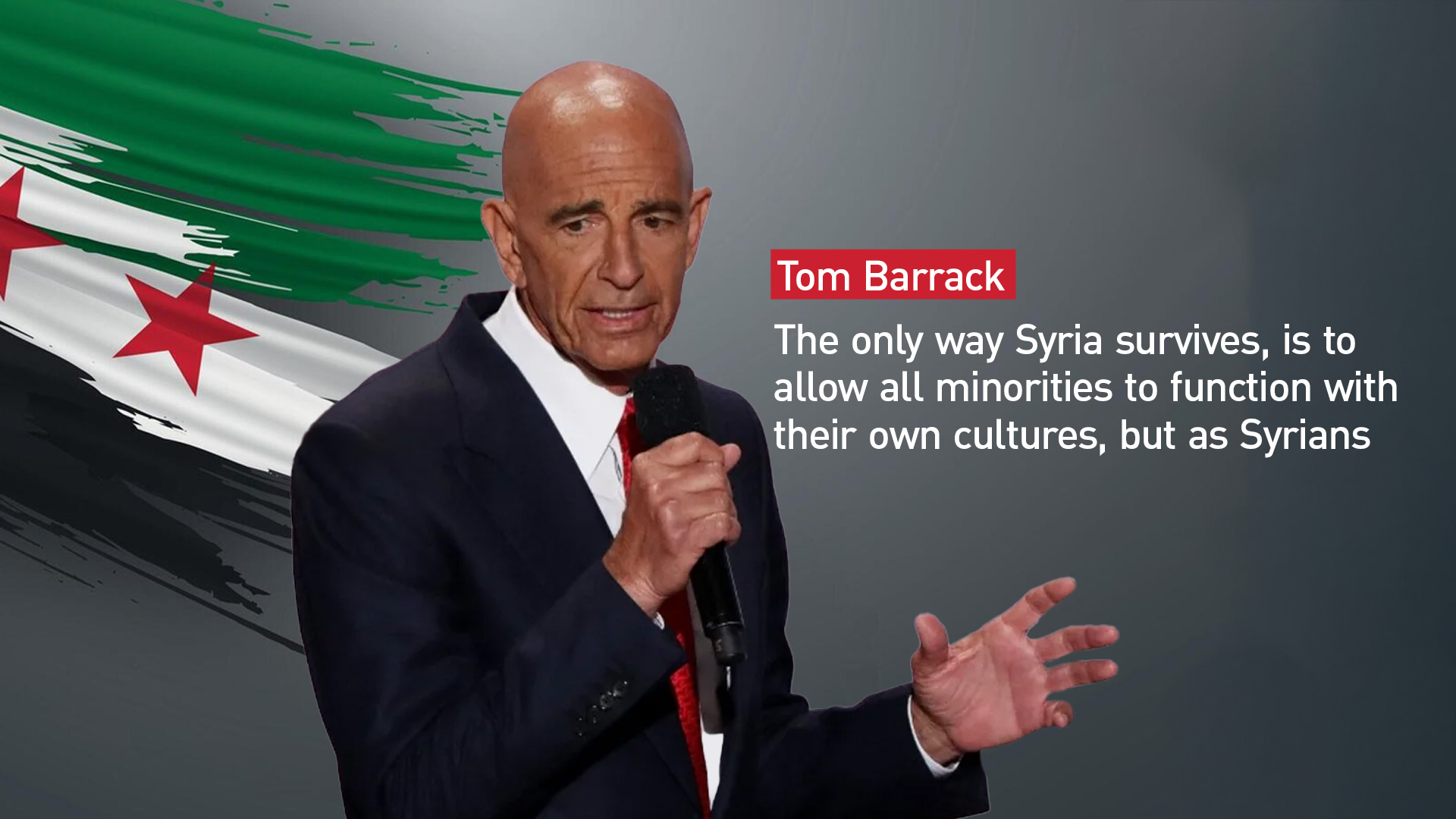U.S. Envoy Warns Syria’s Sharaa Faces Assassination Threat Amid Push for Inclusive Governance
US warns of assassination risk for Syria's President al-Sharaa as he pursues reforms. Envoy Barrack cites threats from radical factions while praising SDF integration and sanctions relief as key to stability.

By Ahora Qadi
ERBIL (Kurdistan24) - The United States is deeply concerned that Syrian President Ahmed al-Sharaa may be at risk of assassination as he pushes forward a post-Assad agenda of inclusive governance, international reintegration, and national military unification, U.S. Special Envoy for Syria Tom Barrack revealed in an exclusive interview with Al-Monitor.
“We need to coordinate a protection system around [al-Sharaa],” Barrack said, citing the danger posed by radical splinter groups — particularly foreign fighters once aligned with al-Sharaa during the campaign to overthrow Bashar al-Assad — who are now being courted by ISIS.
Barrack, who has met twice with al-Sharaa since his inauguration in December, portrayed the new Syrian leader as “bright,” “confident,” and “focused,” describing him as committed to building a “soft Islam, not hard Islam” and forging a pluralistic society that safeguards the rights of all Syrians.
Despite al-Sharaa’s past links to jihadist groups, the U.S. envoy defended him as an “impressive communicator” whose priorities now include cracking down on Palestinian militants, integrating Kurdish-led Syrian Democratic Forces (SDF), and reining in the influence of radical factions across Syria.
Barrack emphasized that delaying economic relief would risk pushing these groups further into extremism. “The longer it takes… the more fraction groups you're going to have that are going to say, ‘This is our opportunity to disrupt,’” he warned.
Kurdish Integration and Security Reform
The envoy lauded al-Sharaa’s March agreement with the SDF to merge Kurdish forces into the Syrian army. But he acknowledged unresolved disputes, particularly over military command, control of key infrastructure such as the Tishreen Dam, and the future of radicalized detention camps in the northeast.
Barrack dismissed fears of renewed armed conflict, stressing that both Sharaa and the U.S. back a strategic decision to avoid direct confrontation between the Syrian Ministry of Defense and SDF forces. “The only way Syria survives,” Barrack said, “is to allow all minorities to function with their own cultures… but as Syrians.”
Sanctions Relief
The interview comes just weeks after President Donald Trump’s dramatic policy shift in Riyadh on May 14, where he met al-Sharaa and pledged to lift all U.S. sanctions on Syria. According to Barrack, Trump acted independently in what the envoy called a “brilliant” move: “This was Trump being Trump, not his advisers.”
Since then, the U.S. Treasury has issued a general license allowing American citizens and businesses to resume financial dealings with Syrian institutions, including the Central Bank. Simultaneously, the State Department granted a six-month waiver to the Caesar Syria Civilian Protection Act. Congressional efforts are now underway to repeal the law entirely.
“There are no conditions. We’re not nation-building,” Barrack asserted. “What we have are expectations of continued transparency.”
From Ceasefire to ‘Silent Understanding’ with Israel
Among al-Sharaa’s top priorities is maintaining stability and territorial sovereignty — including honoring the 1974 ceasefire agreement with Israel. While no formal dialogue exists, Barrack believes a tacit understanding is forming between Damascus and Tel Aviv to avoid escalation.
“Our hope is that both parties… will have a silent understanding with each other that engaging militarily right now would be a horrible thing for both of them,” Barrack said.
‘Flooding the Zone with Hope’
With more than 90% of Syrians living under the poverty line, Barrack emphasized the urgency of kickstarting the country’s economic recovery. He said U.S. sanctions had become a barrier to Syrian-led reconstruction and international aid.
“All we're doing is unwrapping the restrictions that stop the flow of good ideas and good people to help,” he explained, calling it a strategy of “flooding the zone with hope.”
“Even if they're not having more water or more electricity yet,” Barrack said, “they can see a generator being built. At this point, one drop of hope trumps a reservoir of a bad reality.”
A Fragile Gamble
The Trump administration’s gamble on Sharaa represents one of the most consequential shifts in U.S. Middle East policy in recent years — betting that a post-jihadist leader with a record of battlefield pragmatism can anchor a unified and inclusive Syrian state.
Yet the threats remain immediate and real. Barrack made clear that America’s role is not to impose but to protect what he described as “a narrow window of opportunity” — one where “success in Idlib” could be replicated across Syria without foreign occupation or imposed governance.
Whether al-Sharaa’s presidency endures depends not just on policy, but on survival. As Barrack concluded, “We need to deter any of those possible enemy assailants before they get there.”
